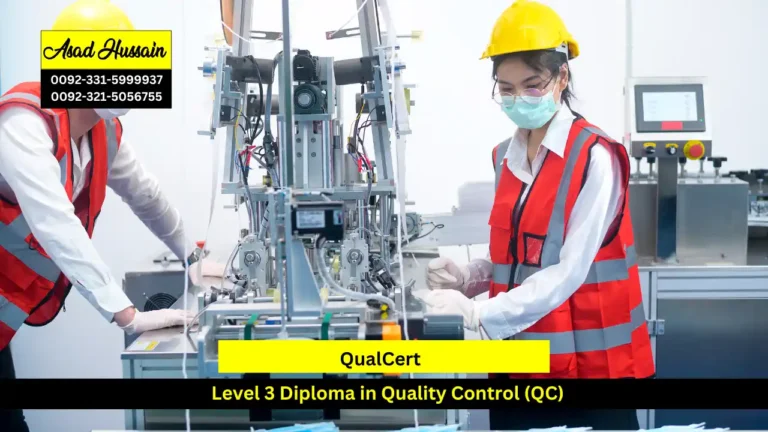The LICQual Level 6 Diploma in Healthcare Quality and Patient Safety is an internationally recognized qualification designed for professionals committed to improving healthcare standards, enhancing patient outcomes, and ensuring the highest levels of safety in clinical and operational settings. In today’s complex healthcare environment, patient safety and quality management are critical to building trust, reducing medical errors, and achieving sustainable healthcare excellence. This diploma equips learners with the knowledge, analytical skills, and practical strategies necessary to implement effective quality improvement initiatives across healthcare organizations.
LICQual Level 6 Diploma in Healthcare Quality and Patient Safety emphasizes the importance of healthcare quality frameworks, patient safety protocols, and compliance with international standards such as ISO and WHO guidelines. Learners will develop expertise in risk assessment, clinical governance, and safety monitoring, allowing them to identify potential hazards, implement preventive measures, and optimize care delivery. The program also fosters a culture of continuous improvement, ensuring that healthcare organizations can adapt to evolving patient needs and regulatory requirements.
Participants will gain practical skills in designing and auditing patient safety programs, analyzing healthcare outcomes, and applying evidence-based practices to enhance service quality. Through case studies, real-world projects, and interactive learning, learners will be able to translate theoretical knowledge into actionable improvements that directly impact patient care. High CTR keywords such as “healthcare quality management,” “patient safety training,” and “healthcare risk assessment” are integrated throughout the curriculum to ensure relevance and visibility in professional development searches.
The diploma prepares healthcare leaders, quality managers, clinical governance officers, and hospital administrators to take proactive roles in maintaining safety and efficiency. Learners will understand how to balance operational efficiency with patient-centered care, ensuring that policies and procedures support both safety and quality outcomes. Professionals completing this qualification will be well-equipped to lead safety initiatives, implement quality assurance programs, and promote a culture of accountability within their organizations.
Moreover, learners will acquire the skills to evaluate clinical practices, monitor performance metrics, and develop strategic plans for quality improvement. This equips graduates with the confidence and competence to reduce adverse events, enhance patient satisfaction, and meet accreditation requirements. The program’s focus on evidence-based approaches ensures that healthcare organizations can make informed decisions while maintaining compliance with industry standards.
The LICQual Level 6 Diploma in Healthcare Quality and Patient Safety is ideal for career-focused professionals aiming to advance in healthcare management, clinical governance, or quality assurance roles. Graduates will emerge as skilled practitioners capable of driving organizational excellence, ensuring patient safety, and fostering sustainable improvements in healthcare quality at local, national, and global levels.
Program Highlights
Mandatory Units
- Principles of Healthcare Quality
- Patient Safety Management
- Healthcare Law, Ethics, and Governance
- Risk Assessment and Incident Management
- Quality Improvement and Performance Measurement
- Leadership, Change, and Organisational Culture
The LICQual Level 6 Diploma in Healthcare Quality and Patient Safety is a professionally developed qualification designed for learners who aspire to lead improvements in healthcare quality, patient safety, and clinical governance. As healthcare systems face increasing scrutiny to deliver safe, efficient, and patient-centered care, organizations require skilled professionals who can implement evidence-based quality and safety initiatives. This qualification provides a strong foundation for individuals seeking to enhance patient outcomes, reduce risks, and foster a culture of continuous improvement in healthcare settings.
Age Requirements
- Applicants must be at least 18 years old at the time of enrolment.
- Candidates under 18 may be considered only with written parental or guardian consent and evidence of maturity and readiness for higher-level study.
Educational Requirements
- A minimum of a high school diploma (or equivalent) is required.
- Previous study in healthcare management, nursing, clinical governance, or quality assurance is advantageous but not mandatory.
Professional Experience
- While not compulsory, 1–2 years of experience in healthcare administration, clinical practice, risk management, or quality assurance roles is preferred.
- Practical exposure to patient safety initiatives, quality audits, or healthcare compliance projects provides learners with a stronger foundation for the program.
English Language Proficiency
- Strong English reading, writing, and communication skills are essential for successfully completing this diploma.
- International applicants must provide proof of English proficiency through recognized assessments such as IELTS (minimum score of 5.5) or an equivalent qualification.
Learners who meet these entry requirements will be well-prepared to excel in the LICQual Level 6 Diploma in Healthcare Quality and Patient Safety. They will gain essential knowledge, analytical skills, and practical experience to improve patient care, reduce clinical risks, and ensure regulatory compliance in healthcare organizations. This qualification also provides a progression pathway to executive-level studies, enabling learners to further develop expertise in healthcare leadership, clinical governance, and quality management strategies.egic planning, and environmental governance.
The LICQual Level 6 Diploma in Healthcare Quality and Patient Safety equips learners with advanced knowledge, skills, and practical tools to lead initiatives that enhance healthcare quality, patient safety, and clinical governance. Upon completing this course, learners will be able to implement evidence-based strategies, monitor performance, and drive sustainable improvements across healthcare systems. The learning outcomes are structured to ensure measurable, professional, and practical competencies aligned with global healthcare standards.
Principles of Healthcare Quality and Patient Safety
- Understand and apply core concepts of healthcare quality, patient safety, and continuous improvement.
- Develop skills to analyze clinical processes and identify risks to patient safety.
- Evaluate the impact of quality standards and safety protocols on healthcare outcomes.
- Apply evidence-based practices to promote a culture of safety within healthcare organizations.
- Monitor and assess the effectiveness of safety and quality initiatives through measurable performance indicators.
Clinical Governance and Regulatory Compliance
- Understand the framework of clinical governance and its role in improving patient care.
- Apply national and international healthcare regulations to ensure compliance and ethical practice.
- Develop the ability to conduct audits, inspections, and risk assessments to uphold patient safety.
- Formulate strategies to integrate regulatory standards into everyday healthcare operations.
- Evaluate policies and procedures to identify gaps and implement corrective actions.
Risk Management and Incident Reporting
- Identify potential risks within healthcare environments and develop risk mitigation strategies.
- Apply structured incident reporting and root cause analysis to prevent recurrence.
- Evaluate patient safety incidents to improve organizational policies and protocols.
- Use risk management tools to monitor, document, and communicate safety concerns.
- Implement proactive measures to reduce clinical errors and enhance overall healthcare quality.
Leadership and Continuous Improvement in Healthcare
- Develop leadership skills to promote a culture of accountability and quality improvement.
- Lead multidisciplinary teams in implementing patient safety initiatives and best practices.
- Apply performance measurement and benchmarking tools to drive operational excellence.
- Foster innovation and evidence-based decision-making within healthcare organizations.
- Plan and manage continuous improvement projects that enhance patient outcomes and organizational efficiency.
Career-Focused Competencies
- Gain expertise to pursue senior roles in healthcare quality management, patient safety, or clinical governance.
- Develop analytical and strategic skills to influence healthcare policy and organizational decision-making.
- Apply professional knowledge to design, implement, and evaluate quality improvement programs.
- Prepare for advanced studies or executive leadership opportunities in healthcare systems.
- Strengthen capabilities to deliver measurable improvements in patient safety and service quality.
Completing the LICQual Level 6 Diploma in Healthcare Quality and Patient Safety ensures that learners emerge as competent, strategic, and results-driven professionals. Graduates will be well-prepared to lead quality and safety initiatives, enhance healthcare performance, and contribute to sustainable, patient-centered healthcare delivery worldwide.
The LICQual Level 6 Diploma in Healthcare Quality and Patient Safety is an internationally recognized qualification designed for professionals seeking to lead improvements in patient care, clinical governance, and healthcare quality standards. In today’s healthcare environment, organizations face increasing scrutiny to deliver safe, efficient, and patient-centered services. This diploma equips learners with the practical skills, analytical knowledge, and leadership capabilities required to enhance patient outcomes, minimize clinical risks, and foster a culture of continuous improvement. Graduates are prepared to implement evidence-based quality and safety initiatives across healthcare systems.
Healthcare Quality Managers and Patient Safety Officers
• Professionals aiming to specialize in healthcare quality management and patient safety programs.
• Quality assurance officers seeking to strengthen their knowledge of clinical governance and risk mitigation.
• Learners motivated to apply evidence-based practices for improving patient outcomes and safety protocols.
• Individuals responsible for designing and implementing quality improvement strategies in healthcare settings.
• Professionals aspiring to reduce clinical errors, enhance service reliability, and ensure regulatory compliance.
Hospital Administrators and Clinical Leaders
• Healthcare administrators aiming to integrate patient safety and quality management into operational strategies.
• Clinical leaders seeking to optimize workflows, staff coordination, and resource allocation for safer care delivery.
• Professionals applying performance metrics to monitor service quality and patient satisfaction.
• Learners focused on aligning hospital operations with national and international quality standards.
• Administrators committed to fostering a culture of accountability, continuous improvement, and patient-centered care.
Policy Makers and Regulatory Specialists
• Policy advisors developing regulations to promote healthcare quality and patient safety.
• Specialists applying healthcare data and research to improve clinical governance frameworks.
• Learners aiming to bridge the gap between policy, regulation, and practical implementation in hospitals.
• Professionals evaluating compliance with healthcare standards and international best practices.
• Advisors contributing to the development of policies that ensure safe, effective, and ethical healthcare delivery.
Supervisors and Departmental Leaders
• Departmental supervisors responsible for monitoring quality and safety performance.
• Team leaders applying risk management and incident reporting systems in clinical environments.
• Professionals fostering collaborative approaches to continuous improvement within departments.
• Leaders ensuring adherence to protocols while promoting patient-centered practices.
• Individuals implementing quality initiatives to reduce errors, enhance efficiency, and improve outcomes.
Healthcare Practitioners in Leadership Roles
• Doctors, nurses, and allied health professionals integrating clinical knowledge with quality management practices.
• Practitioners contributing to patient safety programs, audits, and healthcare process improvement.
• Health professionals applying analytical tools to evaluate and enhance care quality.
• Learners developing competencies in risk assessment, clinical governance, and performance monitoring.
• Clinicians preparing for leadership positions requiring strategic oversight of patient safety and service quality.
Career-Focused Learners and Future Quality Leaders
• Individuals pursuing careers in healthcare quality management, patient safety, or clinical governance.
• Learners developing strategic, analytical, and leadership skills for senior healthcare roles.
• Professionals aiming for progression to executive-level healthcare management positions.
• Career-oriented individuals dedicated to improving healthcare outcomes through systematic quality initiatives.
• Learners motivated to lead evidence-based projects that enhance safety, compliance, and organizational performance.
The LICQual Level 6 Diploma in Healthcare Quality and Patient Safety is ideal for learners committed to advancing healthcare excellence. It equips professionals with the expertise, leadership, and practical tools to implement high-impact quality and safety initiatives, ensuring safer, more efficient, and patient-centered healthcare systems worldwide.







